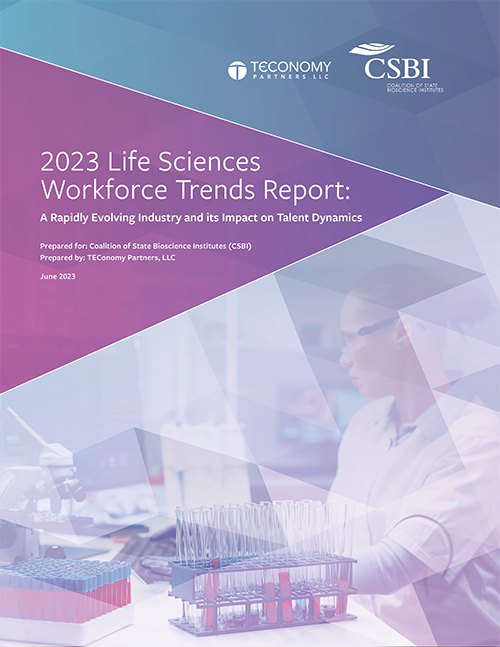CSBI Releases the 2023 Life Sciences Workforce Trends Report at BIO International Convention
BOSTON, MASS., U.S.A., June 7, 2023/ EINPresswire.com / — The Coalition of State Bioscience Institutes (CSBI) releases the 2023 Life Sciences Workforce Trends Report with TEConomy Partners this week at the 2023 BIO International Convention in Boston. The biennial report provides a national snapshot of the most pressing current and anticipated talent needs of the nation’s dynamic life science industry. This year’s report distills a set of key themes sourced from 185 executive interviews and nearly 700 survey responses from companies in eighteen states and Puerto Rico, as well as an assessment of nearly 2.8M job postings from life science companies over the last four years.
This sixth edition of the Workforce Trends report looks at trends that have gripped the industry in recent years, including: the implications of technology investments and deployment for high-demand occupations and skills; the industry’s continued and maturing emphasis on advancing diversity, equity, and inclusion (DEI); the solidifying of remote and hybrid work arrangements; and the need to evolve and deepen industry-academic partnerships as a cornerstone of targeted talent solutions to meet the industry’s outsized demand.
“The CSBI TEConomy report continues to stay abreast of our booming industry’s evolving talent needs,” said Rachel King, President & CEO of the Biotechnology Innovation Organization. “Its timely data, collected with the help of so many of our state and territorial trade associations and institutes, positions us to collectively work to develop a diverse workforce that will lead innovative discoveries and solutions across the globe.”
As in 2021, this year’s report has been produced in collaboration with and with support from InnovATEBIO, a National Advanced Technology Education Center supporting biotechnology education in community colleges supported by the National Science Foundation. The report will be featured at InnovATEBIO’s upcoming National Summit in June at the National Academy of Sciences: Envisioning the Next Bioscience Workforce: A Summit on Industry Trends and Needs.
“The National Science Foundation is pleased to once again support this important collaboration for addressing the industry’s need for highly skilled technical talent, an area where demand continues to critically outpace supply,” stated Dr. Celeste Carter, Lead Program Director, NSF Advanced Technological Education Program. “Working together, InnovATEBIO and CSBI are helping to facilitate the industry-academic-government collaborations that will drive targeted workforce solutions for the U.S. life sciences industry.”
As the country and globe begin to climb out of COVID and to wrestle with continued economic uncertainty, regulation, and more, the life science industry continues to surge ahead, today employing 2.2 million people and expanding its labor force by a net 169,000 workers since 2020. This strong growth in hiring has played out as the overall economy has rebounded and ramped up, leading to intense competition for talent and subsequent impacts on wage growth, recruitment, retention and baseline hiring criteria.
“Mid-way into 2023, it is even more clear to us that we need to bring together the thought leadership, resources and will of multiple stakeholders if we are going to help the U.S. life science industry develop and groom the talent needed to keep up with its accelerated workforce and economic engine,” said Liisa Bozinovic, CSBI Chair and Executive Director of the Oregon Bioscience Association. “CSBI will be working to facilitate and deepen several ‘ecosystem’ partnerships and resources over the next year to address these common talent challenges.”
Download key findings and full report at www.csbioinstitutes.org.
About the Coalition for State Biotech Institutes (CSBI)
The Coalition for State Biotech Institutes is dedicated to ensuring America’s leadership in bioscience innovation by delivering industry-led life science education and workforce development programs through a nationally coordinated effort. Programs are uniquely positioned for life science industry to deliver, replicable in states across the U.S., extensible to other STEM industry sectors and are fully aligned with emerging K-12 Common Core Learning Standards. Learn more at www.csbioinstitutes.org.
About TEConomy Partners, LLC
TEConomy Partners, LLC is a global leader in research, analysis and strategy for innovation-driven economic development. Today we’re helping nations, states, regions, universities and industries blueprint their future and translate knowledge into prosperity. The principals of TEConomy Partners include the authors of the biennial TEConomy/BIO State Bioscience Development reports, published since 2004. For further information, please visit www.teconomypartners.com.






